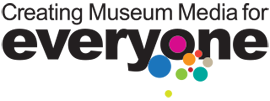Pre-conference workshops will be held at the Hotel Albuquerque on Tuesday June 11th. These workshops are open to HCI+ISE attendees and to New Mexico area residents, please contact us for more details.
Note: Registration is now closed.
Creating Museum Media for Everyone 9:30 - 10:45AM

Creating Museum Media for Everyone (CMME) is a collaborative National Science Foundation (NSF) sponsored project that seeks to further the science museum field’s understanding of ways to research, develop, and evaluate digital interactives that are inclusive of people with disabilities. People with disabilities, including those with age-related limitations, are an increasing part of the population. Although digital interactives hold much promise for meeting the needs of visitors with disabilities, many of the latest approaches to these interactives pose challenges for use by these visitors. Through this workshop, participants will be introduced to the products and processes CMME and other related projects are creating to better meet the needs of and reduce the challenges for all museum visitors, including those with disabilities.
The workshop will begin with an overview of the design and user testing approach used to develop digital interactives for the CMME project and at the Museum of Science, Boston. Additionally, this workshop will feature demonstrations of and hands-on time with four different examples of digital interactives that are inclusive of visitors with disabilities. Designs to be presented in this workshop were developed using a framework of inclusion to better accommodate the needs of people with disabilities, but they were also intended for use by all visitors.
The four digital interactives include:
- An approach to embedding audio into multi-touch tables through the Open Exhibits framework, developed at Ideum.
- A multimodal way of exploring data represented through graphics, audio, and haptics, developed at the Museum of Science.
- The Touch It, Key It, Speak It (TIKISI) system, a multimodal way of exploring graphical information in an eyes-free fashion on a tablet or touchscreen, developed at North Carolina State University.
- A universally designed touchscreen interface that is inclusive of people with disabilities, including those with limited mobility, who are blind, or have low vision, developed at the Museum of Science.
Workshop Facilitators
This workshop will be developed by a team involved in the CMME project, led by the Museum of Science, Boston. This group will include Anna Lindgren-Streicher, Project Manager of Research & Evaluation at the Museum of Science and CMME Project Manager; Ben Wilson, Interactive Media Manager at the Museum of Science; Charles Veasey, Project Manager and Lead Developer of Open Exhibits; and Sina Bahram, PhD Candidate in Computer Science at North Carolina State University.
Open Exhibits 11:00AM - 12:15AM

Open Exhibits is a National Science Foundation (NSF) sponsored initiative that outlines a community-driven approach to designing and developing multitouch applications. This workshop will introduce the Open Exhibits project and attendees will learn how to create a multitouch, multiuser application using the Open Exhibits software development kit (SDK) with XML, CSS, and/or ActionScript. The attendees will also learn how the Open Exhibits framework can be driven by a museum’s database of digital assets. Multitouch and multiuser experiences are changing the ways in which people interact with computers. This new form of interaction has become commonplace in public spaces in the form of kiosks, exhibits, and other installations. Multitouch experiences allow designers to move away from traditional graphical user interfaces and incorporate more natural and intuitive controls. Shared surface computing, multitouch and multiuser environments, presents a new complexity in design. Encouraging collaboration and communication among multiple visitors may take precedence over traditional interface concepts such as designing efficient ways for individuals to navigate or accomplish tasks.
The Open Exhibits SDK was created with these design challenges in mind. The SDK features the Creative Markup Language (CML) for rapid content authoring, the world’s first Gesture Markup Language (GML), and prebuilt multitouch media components.
The workshop will explore the technology and design aspects of multitouch, multiuser exhibit development through hands-on application building using the Open Exhibits SDK. It will discuss the challenges and possible solutions to the multitouch, multiuser user experience.
- Gesture Markup Language
- Creative Markup Language
- Multitouch and multiuser design strategies
- Linking museum digital archive databases to Open Exhibits
The workshop will introduce the Open Exhibits project and Open Exhibits SDK. Workshop attendees will experience the Open Exhibits software framework through one of Ideum’s multitouch tables. The attendees will then learn how to create a basic application using the framework.
Workshop Facilitators
The workshop will be developed by Open Exhibits and Ideum. Among those involved, include:
Jim Spadaccini, Director of Ideum and Principal Investigator of Open Exhibits; Paul Lacey, Chief Technical Officer of Ideum and Developer of the GestureWorks Analysis Engine; and Charles Veasey, Project Manager and Lead Developer of Open Exhibits.
Lunch 12:30AM - 1:30PM
ARIEL 1:45 - 3:00PM
Augmented Reality for Interpretive and Experiential Learning (ARIEL) is an NSF sponsored project to create an exhibit platform that uses scientific visualization techniques to transform modern visitor interaction with traditional hands-on exhibits. This workshop will introduce the ARIEL project and attendants will get a chance to create AR experiences using the ARIEL builder software.
Augmented Reality is an emerging technique for interaction and communication that has yet to be fully explored.
ARIEL Builder is free software, developed to facilitate the use of augmented reality technology in informal science learning experiences. The target user community includes exhibit and program developers who work at hands-on science museums. While the software was developed with this community in mind, all developers are welcome to use ARIEL Builder—in fact, we look forward to seeing how it might be adapted for other purposes!
The goal this workshop is to explore the design opportunities with AR with a hands-on approach using the ARIEL builder to create prototypes. We will use the prototypes to discus the limitations and opportunities with this new medium.
Workshop Facilitators
The workshop will be developed by Steve Snyder and Karen Elinich at the Franklin Institute.

